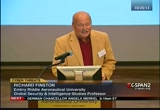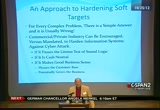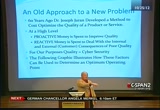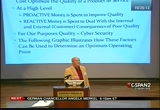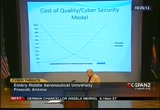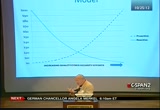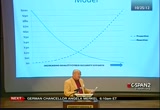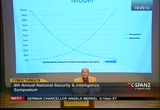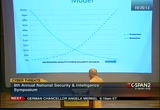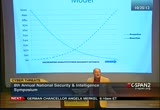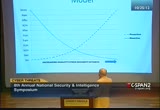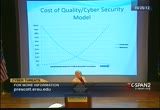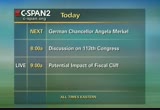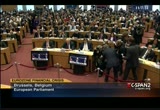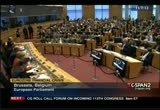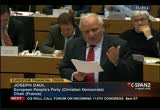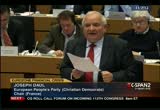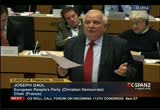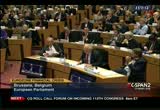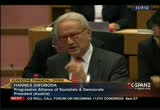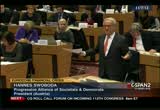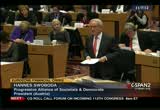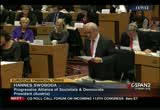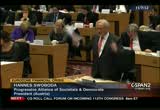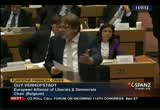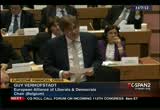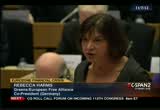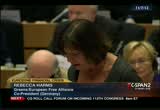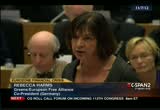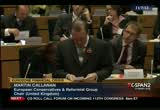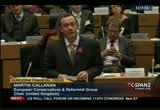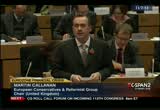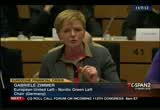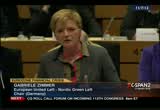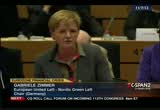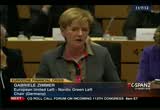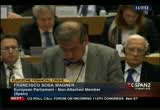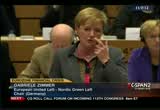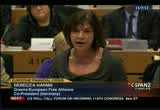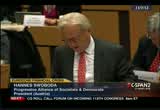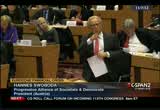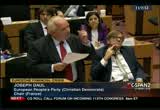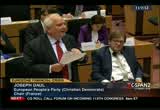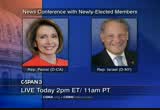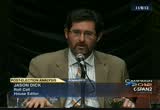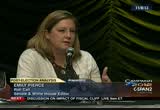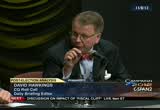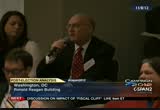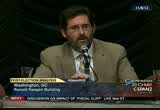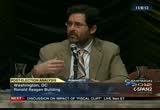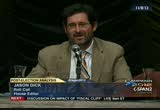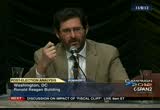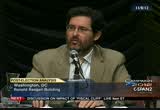tv Today in Washington CSPAN November 13, 2012 6:00am-9:00am EST
6:59 am
>> it's not about pulling debts. it's about working on capital markets. it's about working together up to reduce interest rates for those countries, which are beaten down by these differences in interest rates, which are unacceptable at the current rates that we see on the markets. you talked about jack. i think you're talking about the different european history. he talk to her important
7:00 am
investment is to keep you together. you talked about growth and investing and education and research, but, you know, perfectly well that these are all in decline, greatly in decline because countries are forced to adopt austerity measures. they can't afford to invest in research and investment. that is also unacceptable. chancellor, you talked about how much -- that's your right and your entitlement of course. but i think there's a different angle to that aspect of history. and windows in the future talk about this, they're going to have to think about the millions of unemployed, the increasing unemployment rates, social problems in your country and in others. something that we must respond
7:01 am
to and now i would briefly come to the buffett. chancellor, yes, i'm sure you have a much more reasonable approach to the budget than the uk or elsewhere, but something, there's something very decisive your. if you look at horizon 20 tony or others, -- 2020. on the basis of proposals, where we see that we need to counter that by saying growth and investment in the european union budget shouldn't be cut back. they're part of foundation of the reasonable european budget. finally, chancellor, you're a physicist. to remind us of that again today. as a physicist, you are used to experiments, but is it -- it's an experiment doesn't work shirley got to give up that experiment and try something else. when you see extremity and austerity policies, not saving
7:02 am
money, i'm talking about extreme austerity. your to give up that experiment and move forward with growth, policy of growth, and investment and job creation. because those unemployment people, we have to do something for them. and there's used unemployment as well which is something we cannot sit back and accept. thank you. [applause] >> these are the. >> translator: -- [speaking in native tongue] >> translator: first of all, thank you for your intervention. you didn't read the it this afternoon but a few days ago, you said that the crisis could be over in five years, like in what was you said in the meeting. and i have to tell you i am by nature an optimist, but honestly
7:03 am
i have to tell you, i have my doubts about it. and white? because all the measures we impose to have no effect, have no effect at all if we don't, at the same time, my opinion the real origin of the crisis, the real problem of this crisis is in my opinion today political. it hasn't economic follow. there are financial consequences, but mainly it's a political crisis. the real origin of this crisis is, in fact, the state of authority today behind europe, a state authority behind the single currency. media state can exist without a currency but i don't think that currency can exist without the state. and let me prove this with just a few figures.
7:04 am
we paid an average interest rate as mentioned in italy and spain, the average in europe is 5%, but 90% of that, and in united states they have a debt of 103%. more than in eurozone. and they are paying less than 2% interest rate. and record holders out there in the world, japanese. they have 226% of debt. the same as italy and they're paying 1.5% interest rate, the lowest rate in the world. how is this possible? those with the highest debts, the lowest rate. well, i think an explanation is very simple. behind the end exists a real state, a simple state in japan but in behind the dollar that exist aid budget of 24% of the gdp. and let's be honest, behind the
7:05 am
euro there is nothing at all for the moment. and even a budget of 1% is seen as too high bought a lot of your college. and maybe what you can do, mrs. merkel, is you can mention these figures at dinner tonight with mr. cameron, maybe a good opportunity to mention these figures tonight. [applause] so lets face the reality of today and let's not think that with hard measures we can solve the problem of the euro. the euro is unsustainable, and the euro can disappear if we don't create a real european state with all the building blocks, with all of the ingredients as the americans have already put in place. i should say, 200 years ago. and what does it mean? it means that true european government, a true european democracy, a real european budget, and real european
7:06 am
treasury, and finally, don't forget, also the european bond market, a european bond market, that is the only way to solve the problem that was mentioned here. that ended to hike interest rates today in european union. that is the choice we have. and finally, the last word on the ecb. as you know i have enormous respect for you. as chancellor of germany, but what you have said on the gate was for us unacceptable. the opinion of the parliament, ladies and gentlemen, is respectful and very clear. and what we expect is that the european parliament is treated in the same way as you will treat the germans on domestic matters. european democracy, dear
7:07 am
colleagues, is at legitimate as german democracy. [applause] besought. >> translator: next speaker for the green group and the free european alliance, rebecca harms. [speaking in native tongue] >> translator: thank you president. thank you very much for coming to speak to us today, madam chancellor. we remember you as the european head of government who got the lisbon treaty going. soy discussion with you about the functioning of european democracy is so interesting. i understood you to say that you want to send a message that nobody in germany is following the plan to split the european parliament. the suggestions coming from germany i understood
7:08 am
differently. and i'd like to make it very clear to you that i can't imagine that in future, in the european parliament when it comes to tough decisions on economic and fiscal union, for example, the polish colleagues would leave the room before the vote. i can't imagine that somebody knows europeans history that is behind the idea of having a european eurozone parliament. i can't imagine either that you are -- thinking of eurozone budget when nobody knows where the money would come from. perhaps you can discuss that with them mr. cameron. when it comes to european history, i think it's good that you have pointed out freedom of
7:09 am
democracy, but as i know the eastern southeastern part of european union, that the promise of a better life and justice has been an engine for the big movements we have seen in the eastern part of the european continent. when i look at the results of crisis politics, i can't see that the goal of justice has been pursued appropriately. i think it's depressing that more and more people are worried about what the future looks like. greece is just one part where you can see where one side of the possibility. you won't find anybody in this house he would say we are against saving. what has been contentious in this house is one-sided
7:10 am
austerity policies. after 35 crisis, summits, i stopped counting how many times we have tried to agree with the council in brussels. the outcome of the most summits has been come it will get better now. it's got worse. any downward spiral the european union, through one-sided policies in recent years, has been driven apart. and we've been told by the imf that this vicious circle is getting worse, which starts with austerity policies and lead to recession, and that's getting worse. if portugal, spain, italy and other states will follow greece, that's something which you ought
7:11 am
to note as an analytical physicist. europe, germany should get over this one-sided approach and have a new debate about the other instruments which we need urgently. not to keep the euro stable, but to keep the european union together. thank you for your attention. [applause] [speaking in native tongue] >> translator: now for the european conservatives and reformists. [speaking in native tongue] [applause] spent as the first british mep to speak in this debate, i have an occasional reader of this. let mr. peston i hope you're not getting too much at the waldorf
7:12 am
and what people are saying to you today. i wish more nations headed germany's discipline and enterprising spirit because if they did i think would be meeting here today under entirely different circumstances. and i personally have a great deal of sympathy for german taxpayers because they were never told 15 years ago that this major project would require them to make such a large sacrifices to sustain the single currency but and i think that if i were one of those german taxpayers i think i would probably be a green with your cfu or other colleagues, and oppose more charming money being used to prop up the eurozone. and incidentally i would also be quite restrained that the lives of those parties and the parliaments are a such completely different things to the parties at home. that if i was a german politician i think i would also be quite eager to forge fiscal responsibility onto some eurozone governments but and i agree with you that fiscal
7:13 am
conservatism is, in fact, since the and another famous woman politician once reminded us, margaret thatcher, the problem with socialism is eventually you run out of other people's money. [applause] >> and it's my money were used as a backstop to fear, that i think i also would want to put in place measures to put in place to see that simply more borrowing and more spending could not take place after those countries had been rescued. the problem, chancellor, as i see it is what we are seeing on the streets of athens today is what happens when economic sovereignty is surrendered to some high-end eurozone authority. it has shown us that if we remove the ability of voters to determine their own economic destiny, then we start the countdown to social unrest and we may be seeing the same thing starting in spain as well. and even the greatest optimist can see the eurozone governance
7:14 am
arrangements that you've talked about today, and want to put in place, will take years to implement, even germany i'm afraid doesn't have the kind of money that would bias enough time for those to be implemented. or any, banking union timetable. opening up the e.u. treaties would doubtless see many other currencies, countries negotiating for their own interest. my own country i'm sure would want to see some power returned back to member states. and countries tried to push ahead with more political integration, so you have to be aware that decision is not not shared by everybody else in the european union. and only by listening instead of lecturing a different point of view what we find a way forward. however, ultimately the way i see is that germany is still not facing the same fundamental choices it faced two years ago. you finally delivered the so-called big bazooka, use whatever analogy you like, or you allow those countries that are suffering under the shackles
7:15 am
of an overvalued currency to break themselves free of those monster that could be led by restructuring the euro, particularly and some of the peripheral areas, could mean introducing a stronger currency for coronations along the likes of the guild and mark proposal, a professor. my group does not want to see the euro bill. however, we do want to put this crisis the height is the weekend started focus on what should be our real challenge here in europe, the challenge that is europe's collective lack of global competitiveness. our share of world trade is slowly declining. in the end the root of all are economic problems is our lack of strong growth, and achieving that strong growth requires free market, economic reforms across the continent. and i hope that you and germany would take the lead and started to pursue some of those reforms. thank you chancellor for coming today. [applause] [speaking in native tongue]
7:16 am
>> translator: now mr. nigel farage. spent a good afternoon, everybody. chancellor merkel. so you're off to downing street to negotiate e.u. budget with the david cameron. and you do so against the backdrop of the court of orders yesterday, the 18th year in a row failing to get the accounts a clean bill of health or to do so against the vote in the house of commons last week were a majority of mps were asking you for reductions in the e.u. budget. of course, you do so with a growing anger in britain. why are we pumping 53 million pounds a day of british taxpayers money into these union? doesn't matter of it. cameron is a very weak prime minister but i'm sure you will win that negotiation. but the e.u. budget isn't rid of the question. it is britain's place in this union that is the real question. britain looks like a square peg in a round hole. you see, we didn't join the
7:17 am
eurozone. and that means that every time you one of your summit in brussels, when the big picture going on there exactly nothing for the british prime minister to say. and effect if we do say anything, we now seem as the dog in a manger but the fact is, chancellor, you are leading the eurozone on a journey to a much more deeply centralized and i think more fundamentally undemocratic year. but nontheless, we simply can't join you on that journey. whether it is harmonization of financial market regulation as you said today, whether it is a financial transaction tax, whatever it is the banking and, cameron is forced into position time and time again where there's nothing he can say other than no magic because british public opinion about was the labour party appears discovered a bit of skepticism are bit of opposition, he can enjoy these conversations. now i sense in brussels, not for me but certain around this chamber that increase in growing
7:18 am
hostility, there are many here who blamed the anglo-saxon markets in london and new york for the faults of the eurozone but when you pick that are, chancellor, tonight if you want to downing street, at the mr. cameron, look, this simply doesn't work anymore. it really is time for the united kingdom, but the european union, he hasn't got the courage to save himself, but if you set it to him it might have an impact. [laughter] and all i'm suggesting, all i'm suggesting, chancellor, is that we have a simple amicable divorce and we'll all get along much better in the future of. [applause] [speaking in native tongue] >> translator: thank you. for the group now. [speaking in native tongue] >> translator: okay, please, colleagues, let ms. zimmer
7:19 am
speak. i don't know what i should say me but david cameron. i really don't want to go that far. chancellor, you touched on history a number of times in your speech. i think that's a good thing. we've had today obama's victory, the 95th anniversary of the october revolution, the great socialist day, and you've touched and the historical events. [speaking in native tongue] >> translator: well, i don't really want to cover revolution to cause such enthusiasm in the aisles. well, i mentioned it because you, like me, experience the
7:20 am
winds of change in 1989. and one of the consequences was a system where there was social freedoms, individual freedoms, something that those two things couldn't work together for anything for a time to announce a policy been adopted, the city greece and other countries in the periphery of europe, a policy of austerity that forces people into poverty, it forces them to lose their jobs, smes are getting. they don't have any future, and they're not going to succeed. austerity kills. some of my members from my group have got that message across to you before this mean. and i would refer you to the social rights and committee of the council, the council of your. it suggested a number of measures on a member and where
7:21 am
they infringed the social charter. that is one of the claims for the minimum wage, for those under 25. it's also one of the measures is also the extension of the time period for a redundancy. there are further measures you talked about increasing working time. you've overseen cutbacks in wages, and that's where i would urge you to put an end to these policy. because they are nothing to do with, they don't lead to success if you cut wages. it doesn't succeed. and that is not to be used as an argument for these reforms but it's not reality. is not going to increase competitiveness. what's the use of competitiveness when people are going to the wall? now, now where other countries
7:22 am
are going to have to bear the consequences, bear the brunt of all these measures. recently in the e.u. there was another word brought in, cohesion policy, to replace solidarity. and those policies were perverted by the person of adopting the budget and the financial frameworks. what we need is more money for the cohesion policy, not less for all these tasks that the european has to be. there has to be money in the coffers. so stop the federal government's lock on the contribution about 1%. because it simply doesn't work. we need more policies. and, finally, before the president cuts me off, please consider this. and i would like to know the
7:23 am
answer, whether in the council there is a single member state who can say that with these cuts in development policy or disgrace to the european union, if we're going to shoulder the responsibility for that, with what's happening in nonmember countries, food aid, of the measure having to be cut back to the valley of 7 billion euros. that is disgraceful european union and for us. [speaking in native tongue] >> translator: enka, ms. zimmer. colleague mr. wagner. [speaking in native tongue] >> translator: mrs. merkel, not enchanter, i'd like to thank you for your visit. you haven't forgotten, you shouldn't forget this building where we are is the home of
7:24 am
european democracy. my question to you is this. the german constitutional court has determined the cause -- the clause to be against treaties which is against the freedom of the parties. i would like to know what the german government proposes to do about it? thank you. mrs. merkel, please. [speaking in native tongue] >> translator: s. i only inform the president of my time. for me i can speak. i'd like to begin by answering. i think we have a lot in common but there's a question of the
7:25 am
eurozone budget, which has played well for many of you. what i would like to see is that all member states in the european union become members of the eurozone your that is what the monetary union was about. if we have said that in 15, 25 years time, not everybody would be members, we would've asked different questions. now thinks it turned out differently and went to live with it. at this also means we need a certain amount of, we're going to achieve a certain degree of commitment for all states because some never states have more freedom. those of the current -- common currency, if others want to join our be happy but i can't force them. because the common currency
7:26 am
would fall to pieces otherwise between a commitment on the one answer on the other hand, i can see it certain tasks, which in countries which are do with budget consolidation won't be completed, and i'm convinced that if you want to deal with youth unemployment, you need probably educated young people, and spain and portugal need to build up of location can system can but they we telling us they can do that in the near future. but i can't get that task to spain and portugal without saying at the same time where would you get the financing from? i don't have any hope at all, 27 would agree that these tasks can be done straight away. everybody and europe needs a vocational train system but not everybody will be glad to spend european money on that. first of all, i would like to deal with the maintenance of our
7:27 am
euro because it's important for us all. i can call for this commitment, otherwise i can't see any chance to get there from 27 at the same time. if everybody is a member for almost everybody is a member of the eurozone monday, then we can have stronger combination of structural funds and cohesion of funds, better way of spending and more commitment. but we don't have that time with the euro. the international markets don't give us months, let alone use. secondly, i've heard what you said. and i think that we agree, 50% and youth unemployment of some of our member states isn't just terrible. it isn't worthy of europe. so we must do everything to change that. i came to office at the time
7:28 am
with over 5 million unemployed in germany. one reason i came to office was not a german government made reforms against which part of their party basis, part of the party basis were against, and social and assistance levels were cut. there were dates about what was worthy. we had pension reforms and the retirement age was increased. none of the parties came out of that well. we had to wait five years for the results. we have under 3 million unemployed at the moment. we have a reasonable budget situation. and the point is, if you go through europe and say, we don't have a blind austerity policies and to act as if structural
7:29 am
agreements were not necessary in the countries, you'd be acting against the interests of the union and employs in your. that's not right. greece got into difficulties when the deficit was 15%. it wasn't they didn't have -- nobody was making addition to the deficit was 50%. that was the basis. and if we have the discussion that you just faced the greeks, the situation is bad, we can't change. where to say to them it's not right that you strike every time it the privatization. it's not right touch of a railway system which can't cover its wages through ticket prices. it's not right at the government ministries don't work together but it's not right if you have a
7:30 am
tax system but no taxes are paid. these were not able in europe to deal friendly, kindly to each other, and act as if it's all guided to them supernaturally. we won't make any progress. we are 9% of the world population to we produce 25% of world gdp. and we 50% of social expenditure in the world. if we think we can keep that and do everything without structural reform, if we think we have transparent label -- labour markets from it's no wonder our young people don't get a job. so i will fight for people and i have my experience from germany. that has been right. and a social partnership helps us through these times. our unions have reservations about raising the retirement
7:31 am
age. it's up to politics to make the right decisions. so my request would be this, while europe must change, we haven't been looking at what happens to the rest of the world, 90% of the economic growth takes place outside of your. if we shut our eyes, will be able to ensure our prosperity for the future. mr. farage now. of course, we don't have state authority. but we failed at the constitutional treaty. how did that happen? the referendum in france didn't work out, and elsewhere. we must take the populations with us towards more community, that we can't throw out the baby with the bathwater. and if we have -- and what
7:32 am
happens because the truth is this. when we introduced the euro, interest rates were low everywhere. it meant that the competitiveness of some countries became worse. so we have to make sure that we use our money to improve together. and i sure that the will become a european government one day and ensure the council become a second gym one day, and i'm sure the european parliament will take european responsibilities, otherwise it won't work in the long term. but today, we must say the euro and create the basis properly, and we must give people a little bit of time so they can come with us. i've said a few things to mrs. harm's already. you know, let's be honest. it isn't a one sided austerity policy. that countries who have a program also from the program
7:33 am
have more difficulty with the structural funds than with savings. they are making, taking savings measures, even though they ought to be reforming their labour markets. something, one word on the you gay. i won't have a strong uk in the european union. to make it absolutely clear. i come from germany. the uk was with us when remembered from national socialism. i can't imagine we have british soldier still in shouldn't. i can imagine that the uk wouldn't be part of europe. and i think it's good also for the uk to be part of europe. if you have a world of 7 million you're alone in the world i don't think it's good for the uk. so i will do everything to keep the uk and the european union as a good partner. and so that's what i'm going to
7:34 am
london this evening. i will ask that you can be very happy, but you won't be happy if you're alone in this world. where a strong europe with 500 million, in favor of freedom for democracy and see whether that isn't the case and be happy that we are together. [applause] [speaking in native tongue] >> translator: you said so while the wind of change has caused us in 1989, that was right to have freedom and socialism. it was overseen, and that social and -- that's both right, but,
7:35 am
you know, was also overseen by socialism. but you can't make politics against peoples economic understanding. that was a completely false system which forbade creativity. and if we just talk about the social issues today, just redistributing and others are working to create money, that this depiction doesn't work. somebody has to be entrepreneurs. somebody has to earn and pay taxes. and we need to encourage these people in europe, the small enterprises, the big companies, and if they can create something we can distribute things in a just way. then you have to see to that. [applause] [inaudible] [speaking in native tongue] >> translator: the 5% barrier,
7:36 am
to not criticize the ruins of our constitutional court, but to accept them into the with them. we don't know what the consequences of that will be. it will be mostly up -- but i would say to try 3% and fail again, wouldn't be the right answer to it is difficult. [speaking in native tongue] >> translator: well, the chancellor doesn't want to criticize the constitutional court, simply by the european armament is quite willing to do that. this ruling was a bad one and didn't reflect the actual actual role of the european parliament. [applause] [speaking in native tongue] >> translator: now, i suggest that we do this the other way around.
7:37 am
mr. wagner, would you give me a full answer? thank you. [speaking in native tongue] >> translator: well, that's very good timesaving. [speaking in native tongue] >> translator: mr. farage. >> it's a very different european union, isn't it? 17 european countries and germany are moving some are completely different, and every single proposal you come up with, mr. camp is forced to say no to. so we're going to find ourselves effectively at cinderella state. because you will make two decisions that will affect a single market of which where a member, and we, in fact, according to you, even uk members of this parliament will be able to vote on issues that affect the euro zone which undeniably knock on the single market to go so i missed and which are saying, but, frankly, we find yourself not in a
7:38 am
completely illogical position. with a simple free trade agreement. maybe mr. cameron will agree with you on this, but ultimately the british populace are seeking a totally new settlement. [speaking in native tongue] >> translator: thank you. ms. zimmer. [speaking in native tongue] >> translator: very briefly on two points. on the economy and business. as a foundation for creating income and thus pay for social measures. of course, i agree, but in the conditions of austerity in the next 15 to 20 years, in those countries that are the hardest hit is not going to be possible to have sustainable business being developed. and i would like to know whether this austerity policy and the sustainability policy can be implemented, and whether we can
7:39 am
do anything socially or about the environment. secondly, you talk at one point about the european parliament being an important partner for you and all the crisis related issues. white and has the fiscal pack gotten to the point that it has? when it's already clear that has two points that are conflicting with e.u. law in material and in formal terms, and that hasn't been regulated the european level. and implementation of the pact by the commission, well, how can we go along with that if the parliament is going to be excluded from that? you will have to deal with that on the first of the first. that is to come into force, but it will be impossible to implement it so how are you going to reconcile that contradiction? thank you.
7:40 am
[speaking in native tongue] >> translator: chancellor, let me thank you very much for coming in today. i think it's been an interesting discussion. with certain heard a lot of political rhetoric. wavered not much economic reality from some members but that we are. we're used to it in this chamber. the october revolution was something to be celebrated, but chance of, i wish you well in a meeting with my prime minister this evening. you are of course a fellow member of the group of nations asking e.u. to exercise the same budgetary discipline that requires of its members. certainly david cameron can rely on this board. i think it's a shame you can't seem to rely on the support of your own e.u. one of them is indeed asking for 136 million euros to waste on an unnecessary museum. i hope you can have a word with
7:41 am
him about unnecessary spending in the current economic climate. i think we'd all agree, businesses and family fled across the cotton have to make less money, go further. the e.u. should do the same and make every aspect to cut its budget. we don't need a bigger budget. we need a better use of the budget. i hope you can agree this evening on need for budgetary restraint in the e.u. in the uk now as had been remarked, even the british labour party and, once the budget to be cut. that's the environment we live in in the uk, and totally allow the uk budget to keep increasing year after year after year. austerity is being imposed on many member states when we're seeing cutbacks to many other essential public services is completely understandable. i'm sure you and david cameron would disagree on a way forward. thank you. [speaking in native tongue] >> translator: ms. harms.
7:42 am
[speaking in native tongue] >> translator: i would like to point out, i don't see the uk as strong but as a country which requires them come into the reforms very much, seems to be de-industrialized. i don't think with an anti-european position they can steer this country on a healthy course. secondly, tomorrow i will be traveling to greece. so i've taken a close look at the current situation, and i think you must admit finally that with reform attempts that they've exhausted everything. they have cut pensions, cut wages, within germany, wasn't
7:43 am
imagined. is pure austerity policy. directed from germany. and during the times of the world's worst economic crisis that will end in a disaster. and that must be recognized. mrs. merkel, if the greeks can't be kept under reasonable conditions, then we won't be able to help the of the crisis countries either. it's a disgrace that germany and certain of the still rich companies are carrying out an experiment when it comes to the maintenance of the e.u. i can only be corrected sensibly when the crisis comes to root that they showed now, but that is not right. discourse which is first of all the reforms in the member states, and then we will follow
7:44 am
up with more emu and more, decisions and more common responsibility. i think he will say this of course that you support is not tenable if, get over the militia politics that we haven't seen before. in discourse of blockade from the donor countries which are still wealthy for now. thank. >> i don't think we disagree. the problem is the timing of the
7:45 am
different steps. you are saying yes, i agree with european government. i agree with you european treasure. i agree with you. i will find you. you need it now. that you don't solve the problem around a euro crisis. if you don't put in place these reforms. and let me give you one example. let me give you the example of interest rates. what's happening today? today what's happening is half of the austerity measures, i'm not against austerity, not against austerity in the southern of europe. i think it's necessary for growth on the long term, at half of the profits of this austerity is used to pay high interest rates to bondholders who are living outside europe. what is happening is that german taxpayers money today is used to pay high interest rates to bondholders outside your. that is the reality and the truth today. and it is an intelligent wages
7:46 am
all that. it's not coming from belgium. certainly not. it's coming from -- [inaudible] create. and make it in that way that all these countries will past debates are obliged to reduce their public debt. so a strength and fiscal discipline. we know what. it shall lower interest rates for countries like spain and italy, so that we can recover. so that is my question to you. why not doing that, because an intelligent way we could solve this crisis. but i can say one thing, ms. merkel, this parliament has taken a position on this. the position of the parliament is there is no agreement if there is no reduction from
7:47 am
inside the new pact. [applause] [speaking in native tongue] >> translator: mr. swoboda. [speaking in native tongue] >> translator: chancellor, as a physicist, you appeal for various things, and we've heard about, the welfare, minimum-wage package, you can't apply these sort of things to of the country and spain, portugal and ireland, it's about property. all the points you've raised to venice or structural reforms and so on, i agree, but they are done in a different way. they are put under pressure in a different way. why are these two years so controversial? why are these, the visit of the guard and so on, the tickets, the flight tickets, it's really
7:48 am
tax evasion. the flight of money that is the problem now. what has been said about the uk, of course the uk belongs to and should be part and remain part of the european union, but in the city of london, they don't want britain to leave. yes, of course the populist mr. farage and company do, but ordinary people, well, it might be a popular thing to do a moment about the european union, but i don't really think they bought julie. because they would suffer. so not political leaders and others who can do this for political purposes, but ordinary citizen. and lastly, on the budget we do need of a small budget for growth. others have said that, and you can perhaps say this to mr. cameron, the british who thought
7:49 am
for enlargement, and that's fine. now the british, the polls and the others who are here, and there was a foreign minister speech from poland, now they can say we don't need money from us. if you're for enlargement in one of the leading campaigners for enlargement, they have to be able to make funny of able to all those country, otherwise it's simply unfair. we are fighting for a fair budget, and you could say to mr. cameron here, there's a strong determination, if the budget is rejected, the don't and there are massive cutbacks, we will fight for a reasonable realistic and a growth oriented budget in europe. that is the only way to be strong in the european parliament. that's what we're going to do, and we call for your support. [applause] [speaking in native tongue] >> translator: mr. daul. [speaking in native tongue]
7:50 am
>> translator: i would like to support the idea of the amiable divorce put forward by mr. farage. i would say we want to keep the children with a 26 other children because i don't think you should have custody of those children. so if we really are debating a friendly divorce, i think that the children should come into our custody, including the children from the british marriage. chancellor, you've said quite rightly that any country that wants to join the euro, that isn't a member of the euro can and should, can work with us on the basis of solidarity. i totally agree, and i have another proposal, vis-à-vis solidarity. the british rebate. as my friend mr. swoboda said,
7:51 am
that should be used for the purpose of solidarity. we should no longer send it back. if you want to be serious about our budget, as i said, i think we've always tried to have a serious budget. as i said, 36% goes on investment, only three or 4% of that which is fraud. so how do we explain if this is properly used. i don't agree and i think the decisions that have been taken your were taken on a majority basis to it was a majority but in the european parliament to use the budget. and that such we should show our responsibly. i would ask you something else, i would ask that research and innovation policies we have a major debate in our group this money. and all of us talk about research and innovation policies, but what is european research now, which we should be supporting? and what is the innovation we should be supporting? we really need to create them in the short term, and we need an initiative so that we can, in
7:52 am
fact, apply innovation and create jobs and growth. so we need counsel to help us to get out of this impasse. we have spent five years to get out of a series crisis. i'm sure we could have got out of it more quickly if we have allocated funds were we should have allocated them. thank you upon. [speaking in native tongue] >> translator: thank you, mr. daul. mrs. merkel, please. [speaking in native tongue] >> translator: briefly, to respond to a few things. as regards to legal basis of the fiscal treaty, first of all, what we like to see is we would like to have done that within the european treaties. some countries did want to do that or only under conditions which we would have had to do other treaty changes. for example, financial market regulation which i didn't think was right, so we had an intergovernmental agreement. we said very clearly within five years we want that to be
7:53 am
integrated in european treaties. so not a complete new pillar being built up on the council. members of the council told us that borrowing is one way to go. so we need you, and it's not have to meet to put this into the european treaties as quickly as possible. mrs. harm's, i know a lot has been called for the people of greece. i wouldn't beat about the bush on that. the increase is very rich, and have gone. those who were having to pay the price going forward, for the
7:54 am
sake of responsibility. and the state operators of greece is too big, intentions increase has increased much more quickly than in other european countries, and to compare with portugal, we're speaking with the imf. there are many situations increase, even though the economic strength is different. i wouldn't mind speaking about the baltic countries who carried out incredible reforms, and now on the path of economic growth. in the middle of the global financial crisis, others carried out incredible reforms. today, they have good economic growth rates of. rates. i always so when my colleagues, and college was a social
7:55 am
democrat, you need to talk to him about the greek foreign program. which isn't the situation as regards to the new member states have sacrifices, and are saying very clearly to us what are necessary. and then once again, two points. don't get worked up. to european policy is almost domestic policy. it's almost at home in parliament. that's wonderful that we don't always agree. almost. mr. swoboda -- [inaudible] he doesn't know them. when they're interacting, but
7:56 am
the debt redemption fund, apart from the fact that we don't have a european legal basis, we need to have at least a treaty change. but it doesn't help us in the current situation. none of the countries with the great indebtedness has a chance to pay back their debts. on the contrary, these countries must try to get down there high deficits. and i don't think that that's a good response. and if you say there's no to packed, if we don't agree to the debt fund, that isn't a good message if want to try to find a compromise. but i have noted. the uk was always in favor of enlargement. if you want to enlarge the uk you must be in favor of cohesion. at the moment, we have a huge
7:57 am
crisis with euro, but we will have a crisis if the economic power of europe, also non-europe countries doesn't come together. in the past we did things correctly. on structural and cohesion fun funds. and we should've had more flexibility. and i think we've learned from that, the structural funds at the moment are things spent much more flexible. we've learned a lot of lessons. to joseph daul, i would say the following. germany was a country which propose would have to sit some now on the budget and not wait because for the procession of europe in the world, the question of how much investment is available for europe, this budget is important. if we have a face, if we don't
7:58 am
know who we are investing in 2014, not nudges you can countries, also non-european countries in central europe. almost all of the investment comes from the structural and cohesion fund. so it gives more signal if we agree now. and has regard to research policy, in favor, of course. and our presidency with the european research council which we took forward, and we must give them a modern look to our budget. it is every year we have 40% increase in each and every year, that will end one day. i don't want to end either. it wasn't my message. we will have to see how we can deploy our funds sensibly. thank you very much. i like to thank you for a pleasant afternoon. [applause]
7:59 am
[speaking in native tongue] >> translator: ladies and gentlemen, thank you very much, chancellor. finally, can i just make three announcements? first of all, the open conference of president has had a much higher rate of attendance. secondly, mrs. merkel, yes, i know you heard the point. secondly, chancellor, and as president of this house, i do very much want to get this across but you said something important, anything that happens at european level is an important member of council. the european parliament is a partner in a just and a question of legitimacy to european matches. thank you for that statement.
8:00 am
and i would like to hear that being reflected in the european council. and i hope you would influence things in that way. and i hope, i would urge you to influence that. you talked about latvia. .. >> translator: after all the sacrifices that were made, it would be similar to the slovakian member we were talking about. well, that would be the end of support for the e.u.. so in this budget it's not just
8:01 am
about a few billion here and there, about the spirit of solidarity that should prevail in europe, and i'm thankful that you refer to that. you also talked about the german social democrats. well, it's much better here than it is in the german parliament. you said that too. and secondly, the social democrats are a factor for stability in european policy. i'm sure you'll agree with me when i say that. thank you very much. [applause] [inaudible conversations] >> today newly-elected democratic members of the house are introduced and house minority leader nancy pelosi joins a briefing with members of the upcoming 113th congress.
8:02 am
we'll bring it live to you at noon eastern on c-span3. >> now, now, from cq roll call's election impact conference, a discussion on the new conference. roll call staffers talk about the newly-elected members, what leadership will look like for both parties and committee assignments. this is an hour. >> i'll start chatting while my colleagues come up to join us. the next panel, for those of you who are veterans of this conference, for some years tom and norm do the next bit, but we thought we'd mix it up this time because we have two people who are eminently qualified to talk about the new membership of congress and the new power structure in congress. on my right, jason dick who is the house editor at roll call, and to his right emily pierce who is the senate editor at roll
8:03 am
call. so who better to discuss the structure in a congress that will be more demographically diverse than ever before. as your guide reminds you, after two consecutive congresses in which the female population of both the house and senate was stuck at actually 17% -- exactly 17%. it's gone up to 20% in the senate, and i'm sorry, at least 18% in the house. congress will have its first hindu member next year, a new congresswoman from hawaii. and interestingly, another little-known water cooler fact, for the first time in history an entire state's congressional delegation will be entirely women. all four from new hampshire next year will be occupied by women. still and all, a long way to go to get to 50%, but i guess that's a little bit of progress. also a few more members of
8:04 am
color. as i mentioned before, the house democrats for the first time, their democratic caucus in the house, white men will make up a minority of that crowd. so who's going to run these, who's going run the lives of these people? as you may know, leadership -- three of the four leadership elections are sort of the calling card for the first week of the lame duck. when the lame duck starts next week, but as norm and tom said, the real legislating will be put off until after thanksgiving. next week is about freshmen orientation and leadership elections, so we'll go to jason first to give us a little handicap on the republican and democratic house elections. >> thank you, david. it's nice to be here. i hope everybody has caught up on their sleep. [laughter] the sleep deprivation quotient, i think, in washington goes off the chart the day after the election. let's start with the house republicans. at the top there will not be much of a change.
8:05 am
john boehner will be the speaker of the house, you know, unless something unforeseen happens in the next few weeks. he will be, he will keep the reign. the republicans gained, you know, a few seats, but that's not really going to effect his shot. he ran unopposed in ohio for his own race, and the defining conflict of the republican conference in the 112th congress, this sort of conflict between eric cantor, the majority leader, and john boehner, the speaker, is really behind them at least, you know, from everything that we have seen. the -- so that is remarkably stable, the first three positions. john boehner will be, you know, the next speaker, eric cantor will be the majority leader, and kevin mccarthy will be the majority whip. where it starts to get interesting is for the conference chairman position. this is currently held by jeb hensarling who is making a bid to be the financial services
8:06 am
chairman. hensarling has been a sort of rising star for a while within republican ranks. he was a republican study committee chairman which is sort of the top conservative position in republican circles in the house. there are two people who are making a run for conference chairman. tom price, who's also a committee chairman of the past, he's currently the republican policy committee chairman, he's making a bid for conference chairman, and kathy mcmorris rogers who's vice chairman of the republican congress right now. and they really do represent two different modes. mcmorris rogers is a very effective surrogate for romney. she is from washington, she's from tom foley's old district in the, in central/south washington. it's an agricultural area. spokane is sort of the population center, i believe spokane reaches out to the east,
8:07 am
and yakima for those who remember raymond carver stories from college literature classes. and she, she has, she is a truly charismatic politician. she's able to go on television, she's able to articulate the republican agenda in a way that is sort of nonthreatening to a lot of people. price has -- and she has been running pretty hard. price has kept a lower profile but seems to have accumulated quite a bit of support within the republican conference over the past few years. >> you going to predict a winner? >> i am not. >> okay. what about among the house democrats? what's nancy pelosi going to do with the rest of her life? >> i think i'm going to need to call my lifeline at this point. [laughter] all eyes are on nancy pelosi. about a week and a half ago, pelosi announced that the democratic leadership elections for the house were going to be moved to after thanksgiving. now, the house republican leadership elections in the senate and the democratic and
8:08 am
republican leadership elections are all going to be next week. this is traditionally when things happen. for all the conferences. the fact that she set off this, she set it off a couple weeks led to a widespread speculation that he wanted to see how the election was going to turn out, she wanted time to line up her ducks about whether she would even retire or resign after winning her seat on tuesday. there was a lot of speculation that employees is si would leave immediately after the 2010 election when republicans regained control of the house and she was relegated the minority. she moved up the leadership elections to sort of cut back on the amount of time that people would be able to organize against her. heath shuler ultimately made a move and lost handily, but there was a lot of consternation among democrats that they wanted a little bit more soul surgerying time after d soul searching time after losing so many seats, and they were not afforded that
8:09 am
time. so we don't know what's going to happen. nancy pelosi is in california. her home, in name pa valley -- napa valley, was broken into on monday. so she actually has some literal housekeeping to take care of. they don't know what is missing and sort of this bizarre thing. now, in the event that she does retire or resign from congress, steny hoyer would be the front runner to take over as minority leader. the sort of subtext, it's almost a shakespearian subtext between hoyer and pelosi. they interned together on capitol hill in the 1960s, and they've been rivals for years, most poignantly in the last 10, 12 years as they competed for leadership positions in the democratic caucus. hoyer would very much like to be minority leader, and he would make a bid. the question now is whether pelosi is maneuvering, is trying to line up somebody who would be
8:10 am
her successor of chose. so there's a lot of drama. >> and just rattle off, if you would, who is in that next generation of would-be party leaders who would like to have pelosi's endorsement, or even if they don't, would like to move up? >> the -- right now outside of hoyer the person who sort of generates the most chatter in terms of being a successor is chris van hollen who's a representative from maryland, a democrat. he is paul ryan's foil in on the budget committee in the house. again, a very young sort of take charge, charismatic leader, raised a lot of money. he ran the democratic congressional campaign committee for two cycles, so he has a lot of pull within the caucus. it's complicated a little bit by the fact that he and hoyer are friends, and they both represent the same state, they've run within the same circles.
8:11 am
van hollen was the assistant to the speaker in nancy pelosi's last term as speaker, so that seems to be the surface that bubbles to the top as well. debbie wasserman schultz, the democratic committee chairwoman. nobody does that job for too long. she is looking for a way into leadership, but right now i hesitate to use terms like the smart money, but the smart money seems to be if pelosi wants to anoint a successor or get behind somebody, it would be van hollen. >> thank you. so that shakespearean drama makes what's going on in the senate look tame by comparison. what's going on if. >> i think it is pretty tame. obviously, with the senators adding two seats, harry reid, chuck schumer, dick durbin are all going to be carried on people's shoulders. laugh i don't see any changes there.
8:12 am
the one thing we were hearing on the republican side because you've lost two cements especially in states like montana and minnesota, i don't think anybody is blaming john cornyn for losses in indiana and missouri, but in red states where republicans should do well like montana and north dakota they didn't win those races, and we were hearing yesterday that people are starting to talk about whether or not they want to make a change there. um, now i ultimately think that you're not going to find anyone who either has the juice or the power base or, frankly, the bravery to actually challenge cornyn, but it is interesting to me people are talking about it. >> just to reiterate, cornyn does not want to do the republican campaign -- >> right. i'm sorry, i apologize. again, i'm working on lack of sleep too. running for whip. jon kyl is retiring, and cornyn wants to move up.
8:13 am
he wants to be the number two under mitch mcconnell, and it looks -- and this is his second run. i mean, they picked up six seats in 2010. here he was expected to deliver the majority at the beginning of the cycle. obviously, you know, things turned against them. but i don't think that republicans were expecting the kind of rout that they saw on tuesday. and i think that's, you know, we were talking about republicans soul searching and what not, and this is part of it. i mean, we talked to one senator yesterday who said, look, we're going to be talking about a lot of different things and how to move forward, and leadership races are definitely a part of that. >> you can't beat somebody with nobody, so is there a name that's being floated? >> john thune, who's the current conference secretary, had told us for months that he may make a run for whip. he may stay in his current spot, or he may make a run for rnc chairman. i suspect he will decide to try to stick where he is right now,
8:14 am
and certainly we were trying to get those games on the phone yesterday -- those guys on the phone yesterday, and they weren't taking our calls. [laughter] i think at the end of the day it's unlikely that cornyn actually draws a challenge. thune probably would be the strongest challenge he could draw. >> my question would be would thune have the sort of ability to attract the so-called tea party or the most conservative and confrontational crowd? i thought there was -- or are they waiting for jim demint or rand paul or mike lee or somebody like that to run? >> i mean, if one of those guys, the sort of tea party crowd ran, i don't think they would get very many votes. we talk about them a lot, but in the senate gop conference you actually have a lot more mainstream, establishment republicans than you do tea party people. so it would be more like a heath shuler taking on nancy pelosi after the 2010 elections where it was more a protest candidacy than an actual bid that anyone thinks they could win.
8:15 am
if jim demint were to try to do something like that, i think he would get maybe ten votes. >> and mcconnell, who is the absolute paragon of the republican establishment, seems to have made an uneasy peace with rand paul, his fellow kentucky senator, and it looks to me like mitch mcconnell, who's wanted to be majority leader ever since he and his beagle dog won the 1984 senate race, it was one of the best ads ever. go youtube mcconnell and beagle, awesome. [laughter] ever since then he's wanted to be majority leader. now he may never be because things don't, things don't automatically look all that much better for the republicans two years from now than they are now. and he also will be, face a primary, right, in two years. we should just warn people of that. >> well, he may or may not. i think ha that what he's -- that what he's within trying to do, back in 2010, of course, mcconnell -- there was a contested primary in kentucky.
8:16 am
mcconnell backed trey grayson, but rapid paul won. >> right. >> so people were upset with him. but he has done a lot of work over the past two years to really hug rand paul so close to him, um, and he's let rand paul do just about whatever he wants to do on the senate floor. when rand paul says i want to cause a big stink about something, mitch mcconnell says go right ahead. i'm not going to try to stop you. [laughter] and he's really shored up. i mean, mitch mcconnell is such a talented politician really. he's so smart, and in my opinion, i think he's done everything that he could possibly do to prevent someone from having any -- even if someone wanted to challenge him from the right, i think he's done about as much as he could possibly do to keep them at bay. >> the other, of course, the other aspect of leadership transition in congress will be changes on the committees. your handy guide will offer lots
8:17 am
of details. but i think it's worth -- and we should probably devote some of this to the question and answer period, and i hope you won't feel limited in trying to play stump the band with the three of us and ask us some complicated questions about on secure subcommittees -- obscure subcommittees, and we'll do our best. but in general the macro view of these committee chairmanships, way back in 1994 when they came out of the minority for the first time in 40 years, one of their first so-called reforms was to impose six-year term limits on all their committee chairmen. they felt the old democratic system that was in place from the late '50s through the early 1990s of seniority being paramount and these old white guy taking the gavels in their 50s and hanging on to them into their 70s was a bad idea. so they imposed these term limits, and they've stuck.
8:18 am
it's fascinating to me. i would have figured by now they would have given up on this. and as a result, there's going to be another generational turnover on the house side. so we should just look back to these guys for an overview of what's about to happen. >> yeah, what's important to point out is that the, um, there is going to be a certain amount of turnover. but one of the things that has happened among house republicans in the committee system is sort of like what has happened in california where a lot of state office holders are bound by turbulence where they just start running for other offices. you know, that's one of the reasons that antonioville georgia rosa was term lited as an assemblyman. it does inject talent into positions that you wouldn't necessarily think of, but it does create problems because some of the people in authority expect to be deferred to.
8:19 am
it's great copy. >> the best. >> so some of the committees that are not -- let me just go through a couple of very important committees where we are not expecting turnover. paul ryan, the vice presidential nominee for the republican party, is not going anywhere. he is going to be the budget chairman again, it sounds like. he will ask for a waiver because he's hit his term limits, but that, it's safe to say, will be granted. the appropriations and hal rogers from kentucky who is about as old bull as you can get, old prince of earmarks and reformed nonearmarker now is staying put at the appropriations level. fred upton, who's the chairman of the energy and commerce committee where a lot of health care and a lot of energy policy goes through, the committee of jurisdiction there, is going to be staying for another two years. and ways and means, which might see a lot of action with fiscal cliff, with tax reform, any kind of entitlement stuff also goes thruways and means, dave camp,
8:20 am
another michigander is not going anywhere either. the judiciary committee which is headed by lamar smith right now, he's term limited, he's going to make a bid for the science committee. and he will find himself in competition with james sensenbrenner who has indicated he is interest inside that job as well. ralph hall, who's the republican -- who's the chairman now is term limited. also the transportation and infrastructure committee which is now headed by john mica, and mica is term limited in that role, and there are a few people who have seniority, but they either have committee assignments or are not looked upon as viable. it looks as though we are passing the baton to a new generation. bill schuster, who is the son of bud schuster, the old transportation committee chairman, he is making a very strong play for the chairmanship of that. and that will be just in time for congress to start thinking
8:21 am
about another reauthorization of transportation programs. the highway bill, if you will. there's a short-term extension signed recently, they'll need to revisit that in the 113th congress, and representative schuster will likely be, you know, at least have a strong claim to the gavel of that committee. >> i'll just tick off two more that i'm aware of which are the homeland security committee. peter king, the tv-centric cogman from long island, also term limited, and there's a three-way contest to take the gavel there. candice miller, who would be the only woman on the republican side to chair a full committee. but she's from michigan, and there are also two other michiganders -- >> and another one from intelligence with mike rogers from michigan. >> which brings me to the other mike rogers. believe it or not, the house republicans have two guys named
8:22 am
mike rogers who could be committee chairmen. the mike rogers from michigan and the mike rogers from alabama who also wanted homeland, and then the third candidate is -- i'm forgetting. >> [inaudible] >> mike mccall. exactly right from texas. former federal prosecutor from texas. who actually, i think, we think might be the front runner, i think. be interesting to see if we say that in here. foreign affairs is the other one where there will be a contested race. the incumbent chairwoman, she will step down meaning there will be no automatic women in chairmen's roles next year on the house side. ed royce from california wants the job, so does chris smith from new jersey who has a little bit more seniority, a lot more seniority, but his advocacy for human rights, fighting human rights is actually a negative among some of his colleagues. so to his record -- so, too, his
8:23 am
record the last time he got to chair a committee which was the normally-obscure veterans affairs committee, he kept advocating for spending more and more money on veterans' programs, and they basically kicked him out. so those are two others. >> guest: oh, i should point out, too, that one committee that also will have the same chairman but is probably going to be inserting itself into the public sphere and possibly over health care site is the oversight government reform committee, darrell issa. he will be there for two more terms or one more term, and e has promised robust oversight of the obama administration. >> i'm sure he has. [laughter] and speaking of oversight, isn't that -- that's one of the few places on the senate side where there might be a new -- no, i'm sorry. speaking of government reform. what do they call it? >> yeah, tom carper's set to take over that panel.
8:24 am
joe lieberman's retiring, and susan collins, who's the ranking republican, is term limited out, again, because as we were talking about with the house folks, senate republicans have that same rule. and so it looks like it's going to be tom coburn. which might seem a little, you know, i think coburn has a reputation of being, um, you know, a finger in the eye kind of guy. but he's actually been very serious, and he has a very talented group of people working for him on that committee doing investigations and what not. and carper's a pretty conciliatory guy. i actually think that they'll probably get along pretty well. and both of them will likely be focused on that government affairs part of the committee. um, not that they're going to ignore homeland security, i'm sure they won't. but i think they both have a particular interest in that, in that particular subject area. >> what other top seats are changing hands? >> well, another big one is the budget committee. kent conrad also retiring.
8:25 am
patty murray is up for that seat, and here we see that she's the favorite for it, and i agree. but i do think that there is a possibility that she doesn't take it. and the last time i talked to her people, they told me that, um, that she hadn't made a decision yet. now, you've got to realize when she took the dscc job back in 2010 when harry reid twisted her arm, almost break it to take that job, she basically got him to get her the veterans affairs panel, and this has been a pet issue of hers for her entire career. she is so committed the to veterans' issues that i, i'm a little skeptical about whether or not she would want to give that up and do a thankless job like budget committee chairman. as jeff sessions will tell you until he's blue in the face, democrats have not done a budget for about three years. so, you know, unless a real commitment on the part of harry reid to do a budget in the next
8:26 am
year and he really wants to be serious about that, i don't know what decision she ends up making. >> she didn't have too much fun chairing the supercommittee. >> are well, that's the thing. this is the other thing, though, is that she often takes on these thankless jobs. when senator robert byrd was ailing and couldn't really go to the floor and manage appropriations bills on the floor, patty murray did it. even though she was not the second ranking person, that was dan inway and tom harkin, but she was the one who went to the floor and managed the bills. then the supercommittee, she did that. she did the ds when they asked her. and budget is also a thankless job. i don't know how much more tolerance she has for that. but, um -- [laughter] >> i mean, it does sort of prove that maxim if you want something done, find a busy person, and she certainly has gathered -- >> she's certainly smart enough to do the job. >> right. she's definitely earned the right to say no. >> that's what i think.
8:27 am
and she may want to. now, the next person in line for that job is ron wyden who we think is probably going to take the energy committee because jeff bingaman is also retiring. and assuming that he does that and doesn't decide to go for budget, then it would probably be bill nelson from florida who just won re-election. but here's the thing, this is my conspiracy-minded ways going on here, but if let's say that ron wyden decided that he really wanted budget and didn't want energy, guess who would be chairman? mary landrieu. a complete nightmare for the democrats because she is not, obviously -- i mean, coming from an oil-producing state, she's really not in line with most of the party on those issues. and i had a conversation with a democratic aide not that long ago where i basically said so you guys are going to do everything you can to make sure that doesn't happen, right? even if patty murray decides not to take budget, you're going to make ron wyden stay there,
8:28 am
right? and the answer was, we don't think we're going to get to that point which said to me, yeah, they're going to do everything they can to prevent landrieu from taking that gavel. >> is the republican leadership blanching at the thought of any of the new ranking republican members doing damage to the agenda? i'm thinking, i guess, most about chuck grassley, the now newly-installed judiciary and orrin hatch at finance. >> i think, i think both of them have established their bona fides there over the past couple of years. i think that they'll be fine. grassley has been enough of an attack dog, um, same thing with hatch that i don't think that they will have any problems, you know, continuing. doing what they're doing. >> hatch, i think, suggested when he was running in his highly-contested primary this year that he would be, he would be less of the sort of loosey-goosey deal cutter that he was for much of his career, sort of huing to republican
8:29 am
orthodoxy on finance. he also said he was never running again -- >> that's true. but, you know, after he won the state party convention which is how they do it in utah, they don't really do -- the primary is sort of secondary, he came out and told us back in august at the republican convention that he was very committed to tax reform, he wanted to work on it. max but a us, who's the chairman of the finance committee, also very committed. so it could be interesting. now that hatch has said i'm not going to run again and he got past that, he could kind of do what he wants to do. he could be the dealmaker that he is and wants to be. so we'll see. it depends on how much flak he gets from other people. he has that freedom. >> oh, i'm i'm sorry one thing i wanted to talk about was the overall tone in the house. i wouldn't be surprised even though the republican majority's a little smaller and some of the people who boehner lost are moderates and would be the type
8:30 am
of people who would want to cut deals, it may, um, there may be people particularly as the freshmen move into leadership positions, jim langford is making a bid for the policy committee chairmanship which is, again, a sort of springboard for a lot of people, there seem to be a general calming down among some of the, you know, some of the fire breathing. there's a potential for some mischief on the floor. some of the, as dan new hauser reported in the house section in the guide to the new congress, is some of the more conservative members of the republican party have contemplated, you know, now that the threshold for bringing down a bill is even smaller, we might not even vote for rules. there is that potential for mischief, but you also have people who are one year, one term in. they've now gone through a disappointing election, and they've also seen that there are some things that they can get
8:31 am
done that they feel like perhaps they weren't able to do in the middle of a debt crisis, you know, negotiation and all these short-term continuing resolutions. so the tone in the house i wouldn't be surprised if it ratchets down a teeny little bit because people are just with a little bit of experience, with a few more gray hairs and so forth they might be willing to, you know, sort of take the long view on some things. >> i'm told that yesterday the speaker had a conference call with all the members returning and new members and tried to talk a little bit of real politic to them and said that they needed to, you know, if they wanted to get off to a good start in dealing with the president next year, they needed to tamp down some of their most conservative aspirations and, you know, team building, and they needed to realize that they -- what i thought was interesting was i'm told he said they needed to be able to come up with 218 votes for whatever they wanted to do on their own.
8:32 am
and to not count on the democrats to give them any, any help. that's, of course, a fundamental shift in stated policy from john boehner's predecessor, speaker denny hastert, whose threshold was he had to be able to -- any bill that was going to be passed by the house had to muster a majority of the majority. so only a little bit more than half. so it's sort of a window into even in this postelection period of good feeling where everybody's talking about reaching out to the other side and meeting everybody halfway that already what boehner's challenge is, is to just get his caucus behind him enough that 218 out of the 230 -- whatever they are $232 will vote for it. >> but don't you think, and this is kind of a question for jason. in hastert's case, he had a lot more blue dog conservative democrats to draw from whereas boehner does not, and if boehner's going to compromise
8:33 am
with the democrats, he's going to have to go farther to the left than hastert would have to get the same number of votes. >> the democratic caucus is definitely more uniform in terms of its politics. less separating the most conservative and the most liberal democrat now than there were even four years ago. and i think that that will be a challenge. and certainly the democrats, if they chose to wield power in pretty much the only way they can as a minority party which is to not cooperate, i mean, the number of times that kevin mccarthy, the majority whip, had to go to steny hoyer and say we actually need, you know, 30 democrats, or we need this many democrats to pass the debt ceiling or to pass these, you know, short-term appropriations bills, you know, the democrats were remarkably amenable to being, to providing cover for the republican majority. and if they truly wanted to wield power, they would figure out a way to get something out of that. >> i'll ask one more question
8:34 am
that sort of goes to the same dynamic in the senate, and then -- which is, emily, you and i were talking a little bit backstage about the dynamic, what the results and the freshmen, what that says about sort of where the center lies in next year's senate. so i'd just be interested in your thoughts on that. >> yeah. i think it's interesting that the people who won on tuesday on the democratic side in particular but even i would include the, um, dean heller of nevada who won on the republican side really ran separate from -- not against, but separate from the party platform and the president. you know, if you look at claire mccaskill, john tester, heidi heitkamp from north dakota, joe donnelly for sure in the -- in indiana, these are people who won because they weren't, because they were saying i'm an independent voice, i'm not going to be beholden to my party. and i think that you have an opportunity -- whether or not they take it or not is quite
8:35 am
another question -- but you have an opportunity to have a new center in the senate. it will be mostly made up of democrats, unfortunately, but i think it could be interesting to watch all of those people and how they behave particularly when it comes to tax reform. i think that's one praise where they could be tremendously influential and be the bridge that sort of gets that done. >> terrific. i think we still have microphone assistance, and let's play stump the band or ask whatever you like about next year's power structure. i see one had shot up -- >> i think it's stump the chumps. >> is there way in the back or somebody who's closer who's already got a microphone? here we go. >> what do you see the relationship to be between the hill and the cabinet agencies? i mean, the committees usually are working pretty well. the congressional relationing people, you know, at the
8:36 am
agencies are usually politicals on the democratic side, but there's some pretty good relationships generally. do can you see any major changes or the same battles? i mean, like, we -- i'm on disability, and the health committee works well with us, but do you see any impact -- >> do you work in leg affairs? >> no, i'm actually in a program office, but we have a large constituency of about 180 communities out there. >> with i guess i would just throw out the notion that, um, i think it's relatively universeally agreed on that one of the weaknesses of the white house in the past four years was its dealings with congress. now, maybe that was not at the sort of day-to-day, programmatic interaction between the hill and the -- between the committees and the agencies, but certainly at that top level, you know, the president personally had a, developed a reputation as being almost disdainful of some of the
8:37 am
whole care and feeding of congress and that didn't do a very, didn't do a very praiseworthy job of dealing with members really of either party. didn't do a lot of care and feeding of democrats, certainly didn't reach out too much to republicans, and this is what i'm hearing is sort of one of their stated goals in their performance review for the second, for the second term. >> you know what i think, too, and i don't know what exactly your job is, but i think that in the absence of earmarks that it behooves members of congress and the committees and all of them from both parties to have good relationships with the agencies because they need to, as we like to call it, phone mark things or try to influence the way that the money is going to be spent that doesn't include putting it in legislation. >> and i think that the, i think you're going to see a little bit of a shift again in the house. i mean, so much of the house
8:38 am
committees' relationships with agencies was a bit adversarial, particularly when it came to the health care law, particularly when it came to epa regulations of, you know, the oversight and government reform committee's investigation of atf and the department of justice certainly got very hot under the collar. but as we enter a new phase of, you know, a president's second term, i think everybody starts to calm down a little bit. the health care law is going into another phase of implementation, and the -- regardless of how much there might be a desire among some people to relitigate some of that, they have deadlines to hit, and there's very legitimate oversight not just at the oversight and government reform committee, but within the ways and means committee and the energy and commerce committee on this massive, you know, sort of new orientation of health care that we'll have in the country. so as that enters the implementation phase in
8:39 am
2014-2015 and so forth, i think you're going to see a lot more hearings where people are quite literally saying what's the progress on this aspect of the health care law. and i think that has an opportunity to be a little less driven from posturing and more, okay, the supreme court has ruled, president obama has gotten a second term. that doesn't mean that we're not, that doesn't mean, you know, from the perspective, like, of our own personal feelings that we feel good about the law, but literally there will be some legitimate questions about how, like, things are proprogressing -- progressing. and that might play out, i mean, in other aspects of the government as things get kind of more underway in the sec term. there's kind of a little bit of cruise control at times in second term administrations, but it doesn't seem that the white house is going for anything huge along the line of health care law. so the more nuts and bolts as
8:40 am
pet of oversight d aspect of oversight might take over in house committees. >> oh. yes, sir. >> are there any presidential hopefuls in the congress in 2016? >> rand paul. >> paul ryan. >> marco rubio. [laughter] there, those were the -- and 20 others we don't yet know about. no, john thune -- >> yeah, john thune. >> in i can only think of republicans. i'm trying to think if there are any democrats. john kerry but -- >> two senators who were reelected this week, both of them women, amy klobuchar of minnesota spent some, spent some time at the convention in charlotte going to delegation breakfasts including the one in iowa where she, i belief she echoed sarah palin in saying she thought she could see iowa from her house, which is quite literally true. [laughter] and kirsten gillibrand. of course, there's pent-up
8:41 am
demand for new yorkers running for the democratic nomination for president in 2016 already. [laughter] so as i understand, i think the order of precedence is if the secretary of state the -- state runs, then the governor won't, and if neither of them run, then gillibrand runs. >> i don't know if i just yet see her as presidential material, but she has been someone who has been mentioned who could be picked for this cycle. which would raise her national profile. and she certainly is a talented politician. i think she was underestimated when she was first appointed. and so who knows? >> along those line just to echo that, there is talk that the senator with the golden resumé, rob portman, who's done most every other job in washington may also think about running for the republican senator tore y'all committee job in two years which would allow him to
8:42 am
regroup. he, obviously, is not going to become treasury secretary, he didn't become vice president. um, he still harbors presidential ambitions, he's only 57, and yet -- and so if he wants to start building up a base, he could do worse than to do the same thing that emily's talking about gillibrand doing which is recruit some candidates, get them elected, they're beholden to him, life goes on. >> and i suppose it's worth noting that the one constitutional officer, the vice president of the united states, joe biden, has not ruled it out. [laughter] >> did everybody see him talk about -- >> great copy for us. [laughter] >> that was a, we got the best indication of that on election day. i don't know if you all saw the footage, but when he left his polling place outside of wilmington, a reporter asked him, so, is that the last time -- sort of assumed, i guess that's the last time you'll ever get a chance to vote for yourself, and he said i don't think so. [laughter] it was interesting, very
8:43 am
interesting. >> "the new york times" yesterday had an article, and it seems that one of the biggest shake-ups in both house and senate committees is on the foreign relations committees, so you're looking at guaranteed three of the chair and ranking members being gone, but if senator kerry were to also move conditions, that would be a complete clean slate on house and senate sides, and i'm wondering how you think that might effect the president's ability to deal with some of the top-line foreign policy issues including syria and iran, but also some of the others like foreign aid which has a nice rubber ducky on your catalogs that you're looking at today. >> and we appreciate that. it helps pay our salaries. [laughter] i think bob corker's going to be pretty interesting as the ranking member on foreign relations. he spent the -- he skipped the republican convention the this summer to go to the middle east, you know? and he's been doing a lot of traveling. he's super smart about these kinds of things. and i think that he will try to
8:44 am
mold himself a little bit -- not completely -- like dick lieu bar, honestly. -- lugar, honestly. and he'll be against the hawk as, i think, on a number of occasions. he did a story recently about him, and we had john mccain talking about how much he respected him even though they don't always see eye to eye. but i will say this, i think that, um, the foreign relations panels in both chambers, um, you know, since i guess the '60s really have just not had as much of an impact on what the president does as they, as they used to. um, now, if kerry becomes the secretary of state, you know, then i guess you end up taking what he was hoping to do and having it at the administration level. but, again, that just sort of reiterates what i'm saying which is that you can't do much until you're in the administration about those kinds of things. i don't know, jason, do you agree? >> i think you made a very good
8:45 am
point, and if i could just go back to corker also, corker is kind of this fascinating character to me that, i mean, he is in some ways almost nonpartisan in the way that he deals with a lot of people. i think this may be, you know, his background as mayor of chattanooga. but instead of going to the republican national convention in tampa over the summer, he went to the middle east. now, you know, the -- some people will use these as sort of publicity stunts, oh, look at me, i'm substantive while everybody else is getting drunk, but at the same time, you know, a pretty sharp guy. and he was, during the dodd-frank, um, debate over in two congresses ago, you know, he was actually trying to find a common ground between democrats and republicans. so he has shown a willingness to work with people, sort of, you know, an exercised diplomacy within his own conference. he isn't always successful, but he's shown himself as sort of a person of substance. and with kerry, again, i agree.
8:46 am
if kerry becomes the secretary of state -- which, you know, who knows what's going to happen, who knows what the president's intentions are on that, who knows what hillary clinton's intentions are, if she wanted to stay for a little while in a transition period. i'm sure there's a recently-defeated senate candidate who would love to run for the open seat in scott brown if kerry were to become secretary of state. but it is true that the foreign relations and foreign affairs committees have sort of shown a little bit less influence in the terms of how foreign policy's conducted than any, you know, even the third level of management at the state department. >> yes -- >> always good to use this as a reporting opportunity, ma'am. do you know concern we don't know from our book whether it would be menendez or boxer who would talk -- who would take the job. who would it be? >> i don't know. >> okay. [laughter] >> i suspect it would be menendez. i don't think boxer wants to give up the environment and public works committee.
8:47 am
>> too much power. >> i find it hard to believe she would want to do that. but i've got to say, i think kerry's chances of becoming secretary of state increased when susan rice kind of flubbed her response, her media response, i should say, to the attack in benghazi. i mean, she was already not well liked on the hill amongst republicans. but i also recently when i saw chuck hagel, former senator chuck hagel saying nice things about bob kerrey who was rerunning in nebraska, i thought to myself,huh, wouldn't that be an interesting choice for the president to make? someone who was a longtime member of the foreign relations committee and who is very smart and diplomatic which, obviously, you have to be for that job. anyway, that's just me speculating, but for what it's worth. >> shout it out. otherwise we'll go to lunch. [laughter] >> with people might be hungry. >> i have a question. i continue to be dumbfounded
8:48 am
that senator mcconnell made that statement about his number one priority being to deny obama a second term. not that he would think that, but that he would say it. because with, you know, i guess sort of two questions. why do you think it didn't get even more play by the dems, and secondly, on the hill among the republicans were there people saying why in the world did you say that? it just seems like such an unsmart political thing to say, to me. >> it was a moment where even i was sort of like i can't believe he said that, too, but as i recall -- and, please, correct me if i'm wrong -- he said that to a conservative crowd. it was at the heritage foundation or something like that, and he may have felt, although obviously it was public and not private, a la the 47% remarks by mitt romney, he may have felt that it wasn't going to get much press. >> he did say in a -- and i'm
8:49 am
not sure whether the interview was a, was before or after the heritage remarks, but he did tell the press that that was his priority, that, of course, you know, why wouldn't he, the opposite party? and so it's -- i agree that it's, it's sort of mystifying that somebody who is the consummate operator on capitol hill, i mean, it's hard if you've spent any time in the capitol not to have a respect regardless of, like, where your political leanings are for mitch mcconnell because he is just so good at what he does and so intelligent and really does take that longer view of things. who knows why, you know, he said it, who knows why he said it, why he followed up to say it in the press. there was a lot of euphoria in the republican party in 2010, particularly like this time two years ago. as i remember, there were some, you know, magazine covers that just literally were painted red.
8:50 am
and, you know, people say things in, when they're feeling kind of, kind of goosy. >> yeah. and i suspect, too, that -- i mean, mitch mcconnell is so smart, um, i mean, maybe he made, you know, an impolitic remark there and regrets it now, i don't know. but it also could be, he's a man who rarely says anything that he doesn't plan far ahead in saying. ..
8:51 am
the way that my mother would describe her father, who was a swedish immigrant, that it's as if he is paying for his own words. and sometimes, you really want mcconnell to say something and middle of some big firefight on the floor and he just kind of has this weird kind of looking straight through you and smiling, and moving on. >> the joke joke of course about mcconnell is that half of what he says begins with the phrase not to be redundant, but i'm not going to comment on that. you know? i can tell you how may times he has said that to me. >> anyone? >> question from your end of pennsylvania avenue, what are you hearing or thinking about the cabinet? you've talked a little bit about state, but what are people on the hill saying about changes in other cabinet position? >> the republicans are saying there ought to be a unity
8:52 am
cabinet. and i'm sure that there will be at least one republican in the next cabinet to replace ray lahood who is leading, but i wouldn't expect many more than that but i also wouldn't expect, many of them to come from the hill because those seats are precious to barack obama. just as george bush famously said, or decided, george bush the elder, even though he had great relations with members of congress having served there, he made a conscious decision not to choose anybody from the hill. >> you know, the parlor game is kind of fascinating in terms of like how, you know, gaming out, could you take this person from the state and what the elections or the governor who appoints, the governor of democrat or republican. and i'm guessing that the white
8:53 am
house learned their lesson a little bit in 2008 when you took so many prominent democratic stars, and i'm thinking of janet napolitano. janet napolitano, they give for the worst job in the world, homeland security secretary. it is a thankless job. if anything goes wrong, it's your fault but everything goes right, nobody notices. this is a woman who was, you know, enormously successful in my home state, which i know is not easy, coming from arizona. and she won to really tough, one really tough election and coast to a second term, and she was enormously popular and would have provided -- rich carmona provided a tough challenge to jeff flake but she could've been someone who would've been even like to take on mccain in 20 and/or flake in 2012 if they so wanted. now she's in a position where she might be wanting to move up to the justice department is
8:54 am
eric holder retires, if anybody deserves a break, i think of the eric holder would be the first one in line. from the last four years. or a supreme court nomination, although who knows what happened there? so that's just one example of where the administration reached into the democratic bench, and they rated it ended they didn't have very many people to take people like napolitano's place. and as david said there are only so many seats you can give up, particularly as we saw this grind out world war i type election, you know, where two seats in the senate and eight or nine seats in the house, and we spent $6 billion in this last election. so i would agree that the president might look further into his own sort of association from the past. it's worked out well in the education department with arne duncan, shaun donovan at hud, and those guys are probably in for the long haul.
8:55 am
>> and i don't have the names to give you but i do think it will be interesting to see who replaces tim geithner at treasury. >> who tried to escape. >> yes been trying to escape for a long time, and i think finally he will get his wish. and i'll be interested to see the type of person that the president fixed going forward. because geithner has caused some consternation on the hill, and i think, too, senators of both parties will look at that nominee, whoever it may be, very hard. >> obviously, just how these nominations go, how the senate treats them, how mcconnell treats them will be very good early indicator what nexters going to be like. because if they start fighting over whether the next nominee for the treasury, for treasury secretary wants, i don't know, who knows? when said something nice about
8:56 am
jpmorgan, exactly right, then we're going to be in for a long year. >> you took the question away from me. i was going to ask whether you thought there might be any movement on getting appointees confirmed in the senate? >> i'm not sure understand what you mean, like all appointees or -- >> from what i read, others as well. there are people have been appointed by the president but they've not been confirmed spend i see what you're saying. you're talking about the confirmation backlog. i definitely think that, i mean, not everyone because there's always going to be somebody that some senator or two objects do, but i definitely think that's one place where it's, it's unquestionable that the president has a mandate to install the people that he wants at this point. i think that a lot of the
8:57 am
backlog from at least the past year in administration posts, and in judicial posts has been because they were hoping that they didn't have to have those people. for example, as to what was going to happen with a consumer financial protection board now that the electorate has essentially said, we want barack obama again, therefore, you're not rolling back that particular agency. so yeah, i think you will probably see that actually probably happen in the lame-duck. i don't think that you even have to wait for some of those appointees for the new congress. i think a lot of them will get cleared pretty quickly. >> same with a series of federal judges. there's several federal judges, including famously an appeals court judge to sit on the appeals court in boston who has been back, he's in portland, and he's been backed by both republican senators became as part of they call, what difficult? the thurman road which was -- >> the thurman leahy rule.
8:58 am
spent the person to look to for some guidance here is a interesting, the senator-elect from maine. who was governor as an independent. you probably all know this by now but is coming to washington, claiming that he is his party installation, his party a lime is up for grabs. his initial request was that he would align with whichever party agreed to push for a essentially a doing away with the current filibuster rules. harry reid has made clear he's not going to go that far but we still think angus king will end up combining with the democrats. he did after all endorsed obama. >> and he said yesterday that he had several conversations with him in the past 24 hours. >> and the best he could do was get a phone call from bob corker. sounds like only one side is courting him. but the point being that it is, this is the kind of thing, i think a lot of freshmen, king
8:59 am
most locally among them, they come to the table, come to the senate and say let us not spend our first months in this so there's a just gratuitous filibustering and blocking and holding everything. you know, let's clear out the underbrush. none of us have ever heard of, these are assistant secretaries and, that none of them, probably one or two senators really care, even care about. >> i think also a wrinkle is depending on how much gets done in the lame duck, and dependent on how much the new congress has to deal with, particularly in january and february, if they're still struggling to find a deal on the debt ceiling, if they're still struggling to figure out a way to avert the fiscal cliff, if they go right into a problem with appropriations, you know, because the current continuing resolution expires in march, it sucks some of the oxygen out of the ring to it would be great if they could get all their homework done right now, and then go to bed at a reasonable ho
141 Views
IN COLLECTIONS
CSPAN2 Television Archive
Television Archive  Television Archive News Search Service
Television Archive News Search Service 
Uploaded by TV Archive on

 Live Music Archive
Live Music Archive Librivox Free Audio
Librivox Free Audio Metropolitan Museum
Metropolitan Museum Cleveland Museum of Art
Cleveland Museum of Art Internet Arcade
Internet Arcade Console Living Room
Console Living Room Books to Borrow
Books to Borrow Open Library
Open Library TV News
TV News Understanding 9/11
Understanding 9/11